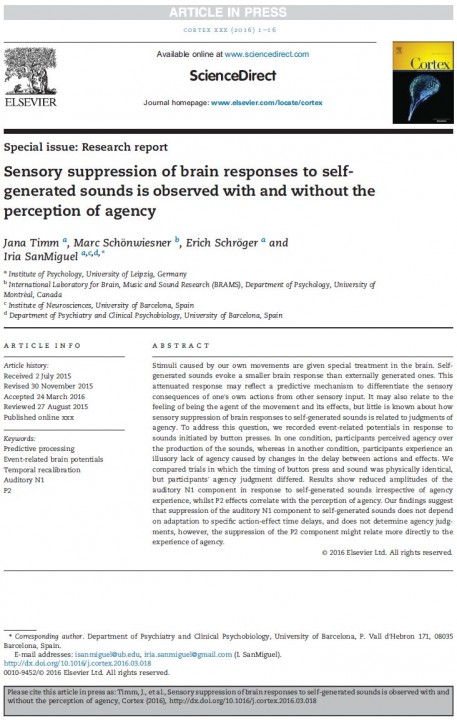The paper entitled Sensory suppression of brain responses to self-generated sounds is observed with and without the perception of agency, by Jana Timm, Marc Schönwiesner, Erich Schröger and Iria SanMiguel has been accepted for publication in Cortex. In this collaboration between the University of Leipzig (Germany), the BRAMS (Canada) and the Brainlab, we investigated the relationship between the suppression of sensory reponses to self-generated sounds and the sense of agency.
The full abstract reads as follows:
Stimuli caused by our own movements are given special treatment in the brain. Self-generated sounds evoke a smaller brain response than externally generated ones. This attenuated response may reflect a predictive mechanism to differentiate the sensory consequences of one’s own actions from other sensory input. It may also relate to the feeling of being the agent of the movement and its effects, but little is known about how sensory suppression of brain responses to self-generated sounds is related to judgments of agency. To address this question, we recorded event-related potentials in response to sounds initiated by button presses. In one condition, participants perceived agency over the production of the sounds, whereas in another condition, participants experience an illusory lack of agency caused by changes in the delay between actions and effects. We compared trials in which the timing of button press and sound was physically identical, but participants’ agency judgment differed. Results show reduced amplitudes of the auditory N1 component in response to self-generated sounds irrespective of agency experience, whilst P2 effects correlate with the perception of agency. Our findings suggest that suppression of the auditory N1 component to self-generated sounds does not depend on adaptation to specific action-effect time delays, and does not determine agency judgments, however, the suppression of the P2 component might relate more directly to the experience of agency.
The full paper is here.


